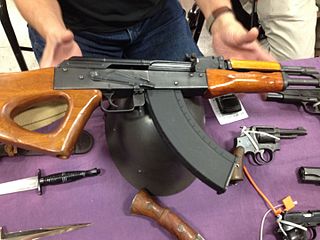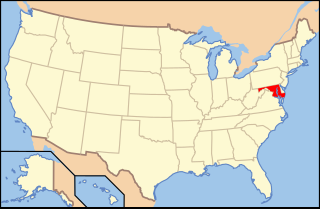Related Research Articles
Gun laws and policies, collectively referred to as firearms regulation or gun control, regulate the manufacture, sale, transfer, possession, modification, and use of small arms by civilians. Laws of some countries may afford civilians a right to keep and bear arms, and have more liberal gun laws than neighboring jurisdictions. Countries that regulate access to firearms will typically restrict access to certain categories of firearms and then restrict the categories of persons who may be granted a license for access to such firearms. There may be separate licenses for hunting, sport shooting, self-defense, collecting, and concealed carry, with different sets of requirements, permissions, and responsibilities.
Firearms in Canada are federally regulated through the Firearms Act and related provisions of the Criminal Code. Regulation is largely about licensing and registration of firearms, including air guns with a muzzle velocity of more than 500 ft/s or 150 m/s and muzzle energy greater than 4.2 ft⋅lb or 5.7 J.
In the United Kingdom, access by the general public to firearms is subject to some of the strictest control measures in the world. Subject to licensing, members of the public may own rifles and shotguns. However, most handguns have been banned in Great Britain since the Dunblane school massacre in 1996. Handguns are permitted in Northern Ireland, the Channel Islands and the Isle of Man which have their own legislation. Scotland imposes an additional licensing regime on airguns, which is not mirrored in England and Wales.
Gun laws in Australia are predominantly within the jurisdiction of Australian states and territories, with the importation of guns regulated by the federal government. In the last two decades of the 20th century, following several high-profile killing sprees, the federal government coordinated more restrictive firearms legislation with all state governments. Gun laws were largely aligned in 1996 by the National Firearms Agreement. In two federally funded gun buybacks and voluntary surrenders and State Governments' gun amnesties before and after the Port Arthur Massacre, more than a million firearms were collected and destroyed, possibly a third of the national stock.
The Canadian Firearms Registry is the gun registry of Canada, requiring the registration of all restricted and prohibited firearms in the country. It is managed by the Canadian Firearms Program of the Royal Canadian Mounted Police (RCMP) as part of the RCMP's responsibilities under the Firearms Act, 1995.
Gun laws in Pakistan allow for the ownership of firearms in the country by the general population. Pakistan is one of the biggest open firearms markets in the world, and is in the modern era also known for its indigenous gunsmith tradition. The country is famous for producing clones of almost every notable weapon of the world. Although firearms are widely owned, heavy weaponry is only permitted in tribal areas within the province of Khyber Pakhtunkhwa. This includes the circulation of rocket-propelled grenades, short, medium, and long-range rockets, anti-aircraft guns, mortars and other types of firearms.

The Firearm Owners' Protection Act (FOPA) of 1986 is a United States federal law that revised many provisions of the Gun Control Act of 1968.
A Federal Firearms License (FFL) is a license in the United States that enables an individual or a company to engage in a business pertaining to the manufacture or importation of firearms and ammunition, or the interstate and intrastate sale of firearms. Holding an FFL to engage in certain such activities has been a legal requirement within the United States since the enactment of the Gun Control Act of 1968. The FFL is issued by the Bureau of Alcohol, Tobacco, Firearms, and Explosives

Gun show loophole is a political term in the United States referring to the sale of firearms by private sellers, including those done at gun shows, that do not require the seller to conduct a federal background check of the buyer. This is also called the private sale exemption. Under federal law, any person may sell a firearm to a federally unlicensed resident of the state where they reside, as long as they do not know or have reasonable cause to believe that the person is prohibited from receiving or possessing firearms.
Firearms regulation in Mexico is governed by legislation which sets the legality by which members of the armed forces, law enforcement and private citizens may acquire, own, possess and carry firearms; covering rights and limitations to individuals—including hunting and shooting sport participants, property and personal protection personnel such as bodyguards, security officers, private security, and extending to VIPs.
In South Africa, the Firearms Control Act 60 of 2000 regulates the possession of firearms by civilians. Possession of a firearm is conditional on a competency test and several other factors, including background checking of the applicant, inspection of an owner's premises, and licensing of the weapon by the police introduced in July 2004. In 2010, the process was undergoing review, as the police were not able to timely process either competency certification, new licences or renewal of existing licences. Minimum waiting period used to exceed 2 years from date of application. The Central Firearms Registry implemented a turnaround strategy that has significantly improved the processing period of new licences. The maximum time allowed to process a licence application is now 90 days.

Concealed carry, or carrying a concealed weapon (CCW), is the practice of carrying a weapon, either in proximity to or on one's person or in public places in a manner that hides or conceals the weapon's presence from surrounding observers. In the United States, the opposite of concealed carry is called open carry.
In the United States, access to guns is controlled by law under a number of federal statutes. These laws regulate the manufacture, trade, possession, transfer, record keeping, transport, and destruction of firearms, ammunition, and firearms accessories. They are enforced by state agencies and the federal Bureau of Alcohol, Tobacco, Firearms and Explosives (ATF). In addition to federal gun laws, all state governments and some local governments have their own laws that regulate firearms.
The gun laws of New Zealand are contained in the Arms Act 1983 statute, which includes multiple amendments including those that were passed subsequent to the 1990 Aramoana massacre and the 2019 Christchurch mosque shootings.
Military-style semi-automatic firearms in New Zealand are those semi-automatic firearms known in the United States as "assault weapons". The phrase is often abbreviated as military-style semi-automatic (MSSA). A New Zealand firearms licence-holder requires an E Category endorsement on their licence before they can possess this type of firearm, and a police-issued permit to procure each firearm is required. Arriving at a clear definition and common understanding of which semi-automatic firearms have a military-style configuration has dominated debate about gun-control legislation in New Zealand since 1992.
This is a list of laws concerning air guns by country.

Gun laws in Oklahoma regulate the sale, possession, and use of firearms and ammunition in the state of Oklahoma in the United States.

Gun laws in Illinois regulate the sale, possession, and use of firearms and ammunition in the state of Illinois in the United States.

Gun laws in Maryland regulate the sale, possession, and use of firearms and ammunition in the U.S. state of Maryland.
This article is about the firearms policy in the Republic of Ireland. Irish law allows firearm possession on may-issue basis. With approximately seven civilian firearms per 100 people, Ireland is the 107th most armed country in the world.
References
- ↑ Lott, John (27 May 2016). "Obama just got one giant step closer towards creating a national gun registry".
- ↑ Terkel, Amanda; Stein, Sam (11 April 2013). "National Gun Registry Creation Carries 15-Year Sentence Under Joe Manchin, Pat Toomey Deal" – via Huff Post.
- ↑ "Firearms Act 1996 No 46, Part 2, Division 2, Section 12 – Genuine reasons for having a licence". NSW legislation. Retrieved 2018-02-24.
- ↑ "Te Tari Pūreke – Firearms Safety Authority" . Retrieved 2023-06-15.